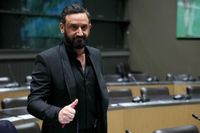Cyril Hanouna's popular talk show "Touche pas à mon poste" (TPMP) officially concluded its run on March 26, 2025, marking the end of an era for the program that has been a staple of French television for over a decade. The show, which had faced numerous controversies and criticisms, was initially canceled when C8, the channel airing it, ceased operations on March 1, 2025. Despite this setback, Hanouna quickly pivoted to an online format, broadcasting TPMP on various platforms including YouTube and Dailymotion, as well as through internet service providers such as SFR, Orange, and Bouygues.
During its brief online stint, which lasted just over three weeks, TPMP aired a total of sixteen episodes. The program reportedly attracted impressive viewership, with Hanouna claiming that more than one million viewers tuned in each night. However, the financial viability of the show in its new format came under scrutiny. As Hanouna himself noted during the first online broadcast, the drastic reduction in the fees paid to panelists was a clear indicator of the economic challenges faced by the production. "We can't kick out three OQTF and we want to fight with the Russians," he quipped during a segment discussing European rearmament, highlighting his often irreverent style.
Despite the apparent popularity of TPMP, the show's financial model proved unsustainable. Reports indicated that advertisers were reluctant to invest in the program, with the last episode offering only three pages of advertisements compared to the five to six pages typically seen during its C8 broadcasts. This lack of advertising revenue was compounded by the fact that many of the advertisers were either institutional or affiliated with the Bolloré group, which owned C8.
In a surprising twist, Hanouna announced the end of TPMP during the last episode, expressing his gratitude to his loyal fans, whom he affectionately referred to as "fanzouzes." "We will be here Monday, live, we will be here Tuesday, live, we will be here Wednesday, live," he stated, before revealing, "Wednesday, my darlings, will be the last of Touche pas à mon poste. We are going to have a big party." His emotional farewell left many wondering about the future of both the host and the format that had defined his career.
Looking ahead, Hanouna is set to join M6, where he will host two daily shows starting September 1, 2025, on W9 and Fun Radio. However, his transition has not been without its challenges. Recently, he faced backlash from M6 for publicly criticizing fellow radio host Bruno Guillon, raising questions about the nature of his future role within the organization. Hanouna's public remarks have led to speculation about whether the management at M6 may have pressured him to conclude TPMP to avoid further controversies before his official arrival.
The end of TPMP also reflects a broader shift in Hanouna's approach to media. The show, which had increasingly become a platform for political discourse, was known for hosting a diverse array of guests from various political backgrounds, including ministers and opposition figures. This shift towards a more politically charged format drew both praise and criticism, with some arguing that it blurred the lines between entertainment and serious political commentary.
As the show evolved, it faced significant controversies, including a notable incident in late 2022 when former TPMP panelist Louis Boyard criticized Vincent Bolloré, leading to a public outburst from Hanouna and a hefty fine for the channel. This incident marked a turning point in Hanouna's relationship with political figures, shifting from a more inclusive approach to one that increasingly alienated certain groups.
Despite the controversies, Hanouna has maintained a significant following, often positioning himself as a voice for the everyday person. He has previously expressed ambitions that extend beyond television, hinting at a potential political career. In 2020, a comic book depicted him as "The President," and he has made statements suggesting he understands the country better than traditional politicians. Recently, he even aligned himself with the anti-woke movement, citing figures like Donald Trump as symbols of this ideology.
As Hanouna prepares for his next chapter on M6, the question remains: how will he navigate the transition from a politically charged talk show host to a more conventional entertainer? Will he be able to maintain his unique voice within the confines of traditional media, or will he adapt to the expectations of his new platform? His fans eagerly await his return, while critics will undoubtedly be watching closely to see how he balances his controversial style with the demands of a new network.
In conclusion, the final episode of TPMP marks not just the end of a show, but a pivotal moment in Hanouna's career. As he moves forward, the landscape of French media will be watching closely to see how he reinvents himself in this new role, and whether he can continue to resonate with audiences in an ever-changing media environment.







